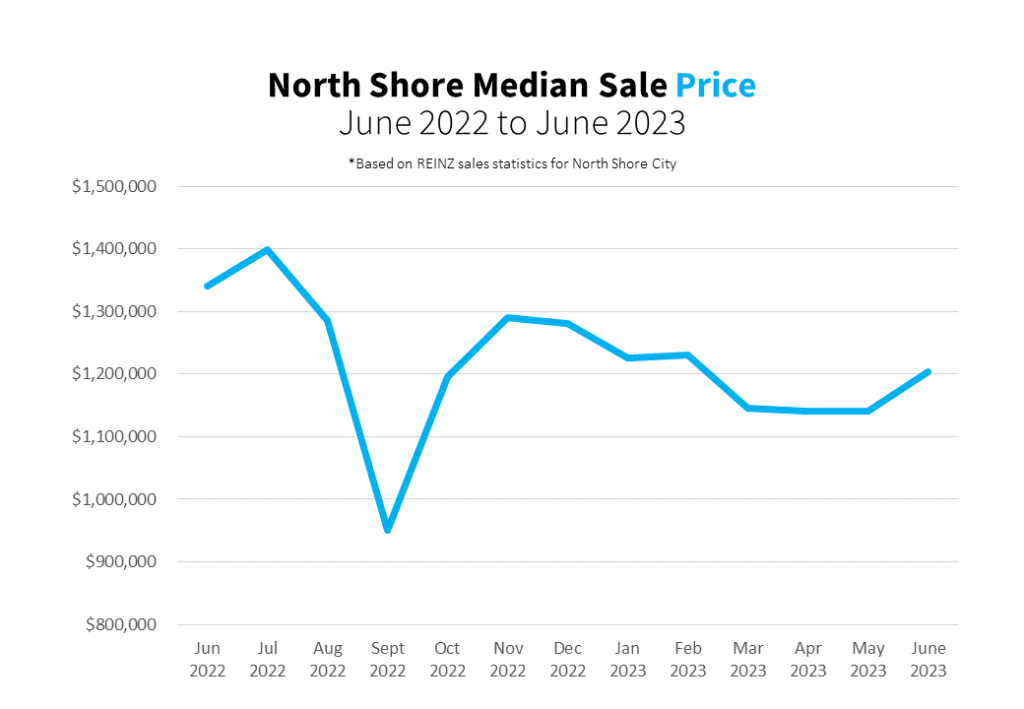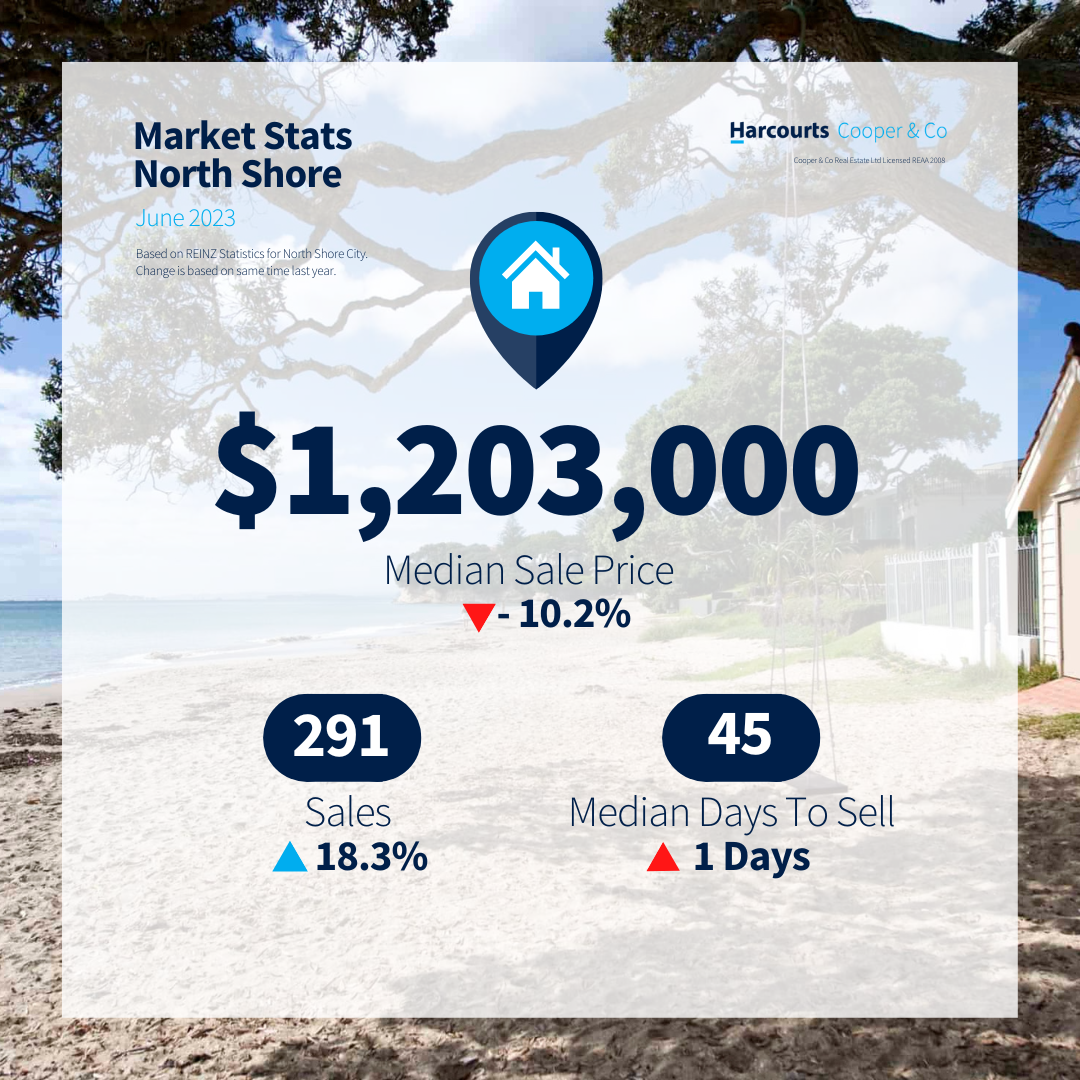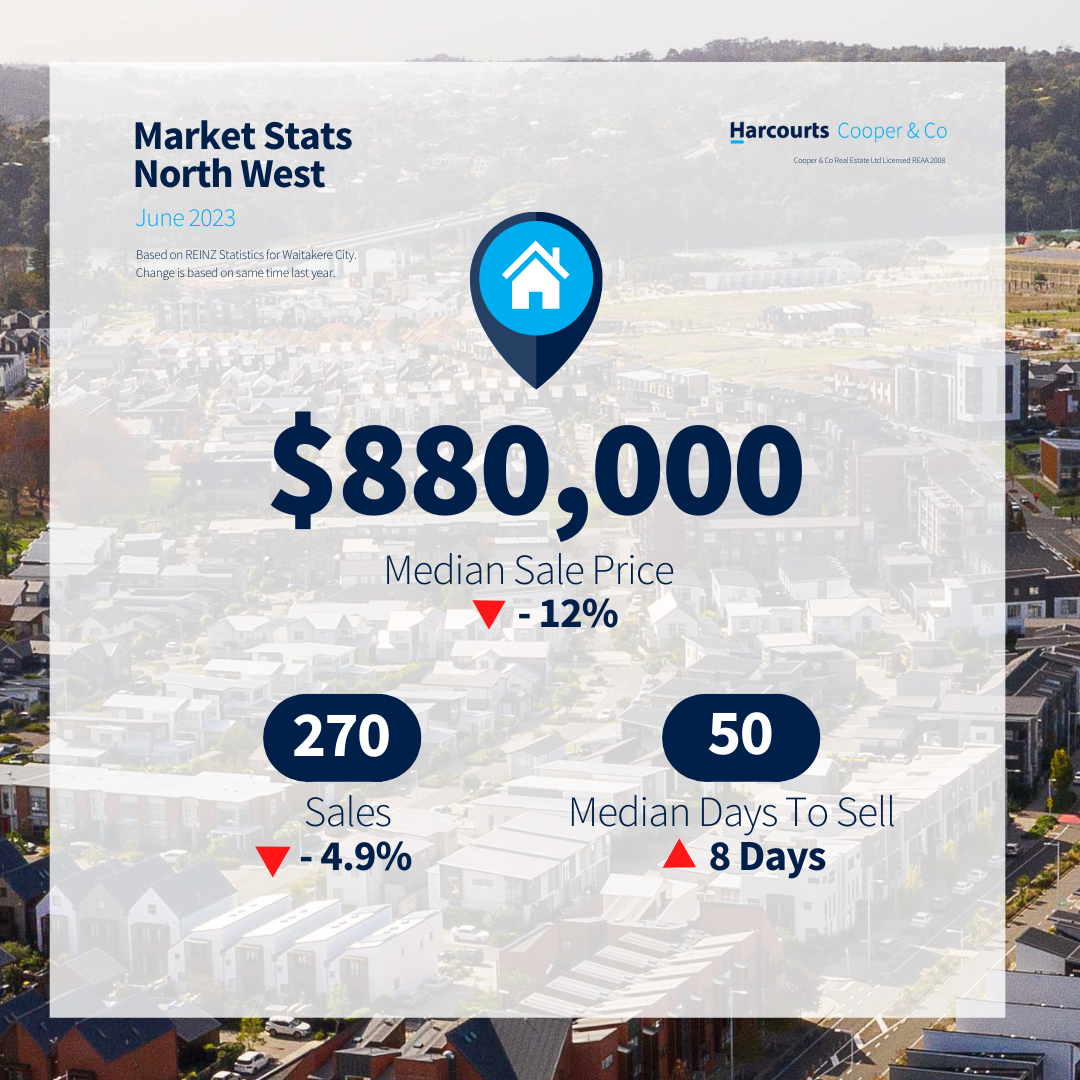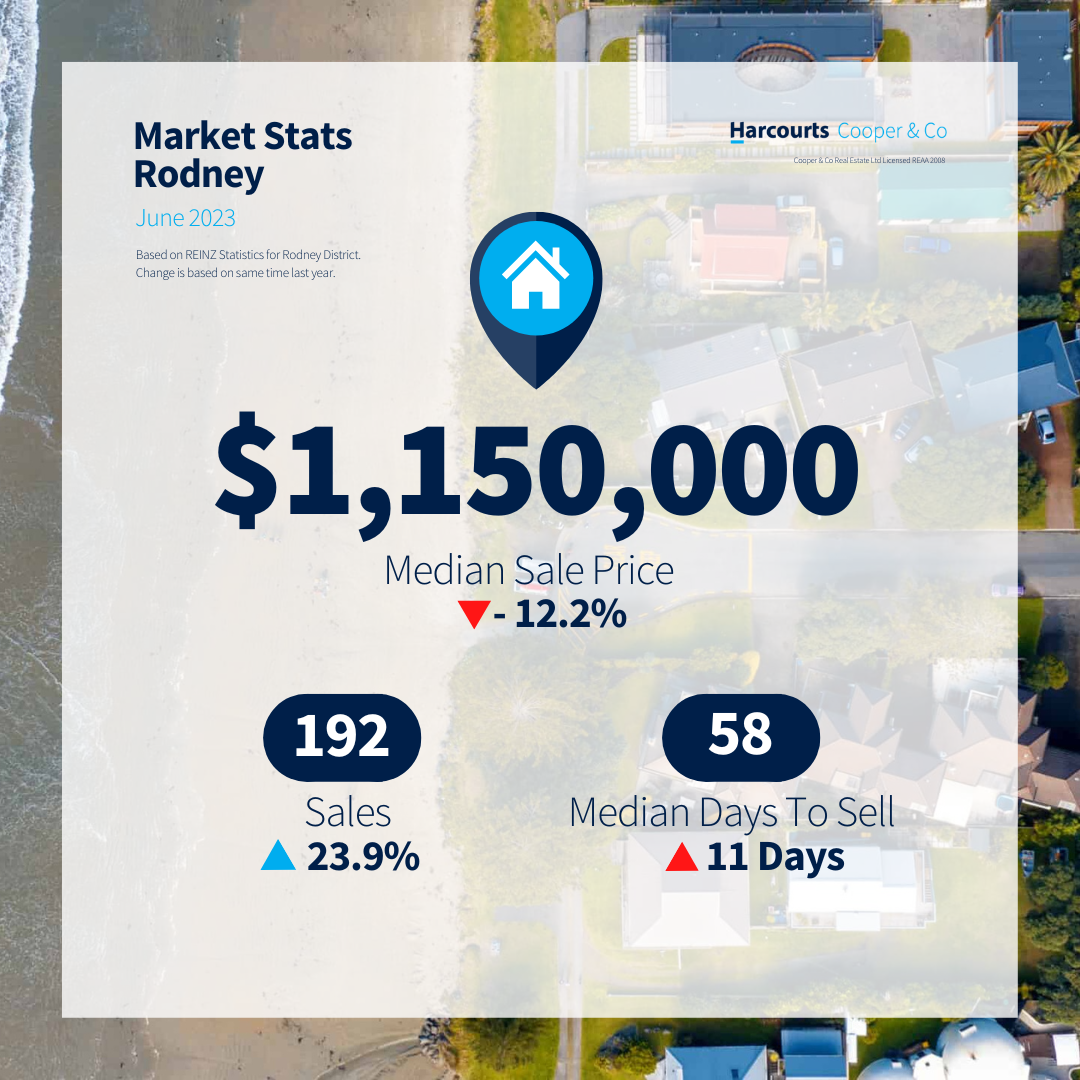Property Market Update - June 2023
June’s month of month price increase here on the North Shore was the first notable increase in 12 months – another indicator the market has passed the bottom of the cycle.

As buyers rapidly return to the market, the increase in sales is eating into current stock volumes.
The urgency amongst buyers has been evident with Open home attendance up and auction rooms over-flowing.
This surge in activity combined with reduced stock levels will continue to place upward pressure on prices.
Inflation has fallen to its lowest levels since late 2021, yet at 6% still more than its target band, meaning the OCR will likely need to remain high for an extended period. It is however another data point heading in the right direction for a return to sustainable growth in house prices.
Despite being mid-Winter the market reaction to the changing climate is evident and a renewed level of activity emerging.




Winter may be a quieter season for listings and sales, but with fewer homes on the markets and less competition, it’s good news for sellers with more chance of their property standing out from the rest. Don’t let shorter days and colder weather put a damper on your home selling plans. Improve your chances of a successful sale this winter, with 3 strategies to showcase your home at its best even during the coldest months of the year.
1. Embrace the cosy factor.
Winter offers the perfect opportunity to showcase your home’s comfort and warmth during the colder months. From incorporating winterthemed decor to creating inviting spaces that evoke a sense of cosiness, there’s no better time to show off your home’s features than during winter open homes.
If natural light doesn’t flood into your home during open homes or when potential buyers are viewing, turn on lamps and lights to give your home a lift and make it feel bright, spacious, and appealing.
Turn up the temperature by switching on heaters in every room to create a warm and inviting space, and ensure damp and mould is treated and cleaned, and that your home is well-ventilated and free of condensation.
2. Maximise curb appeal.
While winter may conceal your home’s exterior charm, it doesn’t mean you have to give up on making a stellar first impression. Enhance your home’s curb appeal even in the midst of cold weather, by utilising the exterior space in your garden and outdoor areas.
Get the water blaster out and clean your home’s exterior, paths, and driveway. Cut back trees and shrubs around windows and doors to let the light inside your home. Pull out the weeds, tidy the garden and mow the lawn, and touch up on any untidy bits of paint outside your home. Add bold house numbers to ensure your home is easy to find, clean or pack away outdoor furniture, and add some winter flowering plants to brighten up the outdoor space.
3. Get help from an expert.
Collaborating with a local Harcourts real estate agent who has a track record of successful sales in your area is a great way to ensure your home is marketed to showcase its unique features and achieve the best sales price.
Before choosing a real estate agent, get recommendations from family and friends, attend open homes in your area to get insight into how real estate agents work, check references and reviews, and meet with potential candidates to find someone you feel comfortable with.

New Zealand’s housing market has seen its fair share of ups and downs over the years, with the most recent drop in property prices linked to interest rate rises and cost of living pressures. But the tide may be turning, and there’s growing evidence to support a property rebound sooner than anticipated. Buyers choosing to wait for property prices to go lower should consider the impact that decision could have on borrowing power once property prices go up.
Demand vs. supply
Demand for housing in New Zealand continues to grow, driven by a shortage of affordable housing and a surge in net migration.
Across the country, real estate agents are reporting an increase in buyers at open homes, in particular first home buyers, while at the same time, auction clearance rates in Auckland are showing early signs of an upward trend, suggesting this market is coming back to life far quicker than anticipated.
In his recent monthly survey, economist Tony Alexander reports that buyers are becoming less worried about property prices falling and the fear of overpaying – FOOP – and more concerned about missing out, as the level of FOMO is starting to creep up.
Property investors re-entering the market.
The housing market could see strong interest from property investors anticipating a change in government in the upcoming election, further increasing competition and driving up property prices.
Legislative changes would make it more attractive for investors to return to the market, with National pledging to reinstate a key tax advantage for investors that Labour is currently phasing out.
Prior to 1 October 2021, mortgage interest deductibility allowed investors to subtract mortgage interest payments from their rental income for tax purposes. But this is being phased out to incentivise property investors to build new homes in an effort to fix the housing crisis.
Additionally, National has pledged to reduce the bright-line test from between five and ten years to two, effectively removing any capital gains tax for most investors.
A pause on the OCR
Another factor that could drive the housing market upward is the Reserve Bank of New Zealand’s (RBNZ) recent indication that it won’t be lifting the official cash rate (OCR) higher than 5.5 per cent. This follows an increase of 25 basis points earlier in May 2023.

Deb is passionate about the property industry having worked in construction development, project management, property investment and property management; she has an unwavering commitment to revitalising the performance and reputation of the property management sector, advocating for positive change.
We had the opportunity to speak with Deb and delve into the details of her typical workday.
Q & A with Deb McKinnie of Harcourts Cooper & Co
IW: What would you do during a typical day?
DEB: The course of a day in property management can be influenced by so many factors, that it’s rare for any two days to be identical! As the GM of Property Management, my primary responsibility is to ensure that I offer comprehensive support, advice, and guidance to help the team navigate their roles in this highly demanding industry. This involves providing technical expertise on legislation, handling disputes and relationship challenges, designing and implementing processes for greater efficiency, as well as developing and managing our goals and commitment to providing world-class service. As we have a 300+ strong sales team, a key part of my commitment to the Company’s overall success is in supplying crucial information to our sales division to enable successful transactions of the sale of rental properties.
IW: How did you get into this industry?
DEB: From the early stages of my career, I had a strong sense of passion for the property industry. I started my journey in the Construction sector, working as a project and development manager on luxury apartment builds. My enthusiasm for delving deeper into property led me to transition into a property investment firm looking to enhance its property management services for investors.
The world of property management is characterised by its fast-paced nature, where new challenges and opportunities arise – on a daily basis! It’s in this high-pressure environment that I truly thrive. Property Management continually delivers the dynamic and exhilarating atmosphere that I crave!
IW: What do you enjoy most about your job?
DEB: I truly believe in the importance of the service we provide to our clients and the value of having a professional property manager – to support individuals on their journey to wealth creation. Achieving home ownership in New Zealand often requires a lifetime of dedication, and it ultimately becomes a legacy we pass on to future generations.
I have long believed that Property Management is an industry that is significantly undervalued and underrepresented. So, I am deeply committed to elevating the standards, service, and reputation of those who tirelessly work in this field. While investing in property can yield long-term rewards, it is not without its risks. My primary goal is to minimise these risks for the clients we represent, ensuring their investments are safeguarded and their journey towards a comfortable retirement is as smooth and secure as possible.

IW: What is the most challenging part of your job?
DEB: Property Management can indeed be a challenging environment, as we frequently find ourselves delivering news that may not be well-received by those we interact with. Managing and prioritising the mental well-being of my team is of utmost importance, especially as they navigate through a continuously evolving legislative landscape.
The frustrations experienced by our investors, stemming from economic, political, and financial fluctuations, can often impact the well-being of the team. Creating a supportive culture is crucial in order to address these challenges. It is essential to recognise that, as property managers, we are often caught in the firing line merely for being the messenger of news that may be unwelcome – so managing negativity is an ongoing part of the role.
Ensuring their mental health remains a priority, allows them to navigate the demands of the role with resilience and continue to provide outstanding service in the face of (and despite) adversity.
IW: What advice would you give others that are looking to move into this industry?
DEB: If you’re considering a move into Property Management, it’s important to carefully evaluate your skill set and mental toughness. Having a high level of resilience is paramount, yet often not enough emphasis is placed on this aspect during the recruitment process. Exceptional dispute resolution skills are essential to effectively manage stakeholders and meet their expectations.
It’s worth noting that the average career expectancy of a Property Manager in New Zealand is approximately 9 months, which speaks volumes about the challenges of the role. Given this reality, it is important to seek a manager who will prioritise your well-being, growth and development. Set clear boundaries in terms of work-life balance to prevent burnout. This will help you decide if you might be a good candidate for the demanding nature of Property Management and increase your chances of long-term success in the field.
Source – Inspirational Woman
